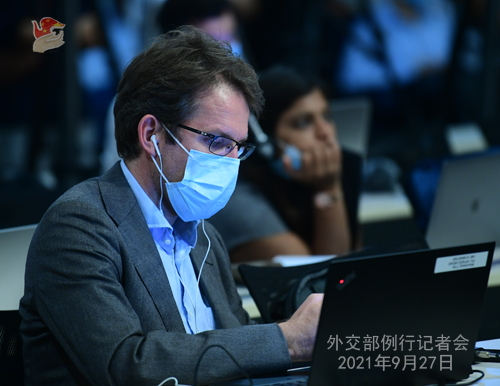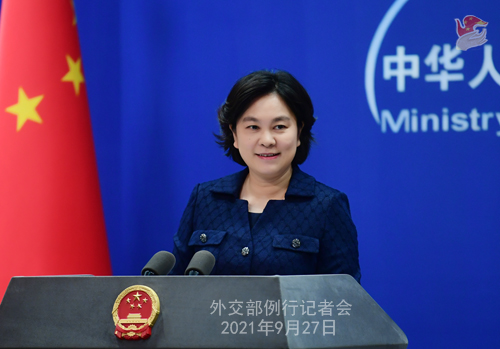
As agreed upon by the two sides, State Councilor and Foreign Minister Wang Yi and EU High Representative for Foreign Affairs and Security Policy Josep Borrell will hold the 11th China-EU High Level Strategic Dialogue on September 28. Against the backdrop of rising instability and uncertainty in international situations, it is necessary for China and the EU to conduct strategic communication and strengthen coordination and cooperation. The two sides will exchange views on China-EU relations, dialogues and cooperation in various areas, and international and regional issues to promote sound and steady development of China-EU relations and jointly respond to global challenges. This strategic dialogue will be convened via videoconference.
CCTV: Through unremitting efforts of the Chinese government, Ms. Meng Wanzhou returned to China on the night of September 25. This has heartened the Chinese people and drawn much attention from international media, which is widely believed as a victory for China. Do you have any comment?
Hua Chunying: The Meng Wanzhou incident is a political frame-up and persecution against a Chinese citizen, an act designed to hobble Chinese high-tech companies as represented by Huawei. Through unremitting efforts of the Chinese government, Ms. Meng Wanzhou has finally returned to her home country safe and sound. We are truly happy for this.
Since Meng was groundlessly detained in early December, 2018, our Party and the Chinese government have attached high importance and President Xi Jinping gave personal attention to this. The Foreign Ministry, together with the Chinese embassies in the US and Canada and the Chinese Consulate General in Vancouver, has worked at various levels and on multiple occasions, provided consular protection and assistance to Ms. Meng Wanzhou, and lodged solemn representations with the US and Canada, asking them to drop the erroneous charges against Meng and ensure her safe return to China as early as possible. Other departments concerned have also done a large amount of in-depth and careful work. The Chinese people have given their full support throughout this course, and an online petition demanding the immediate and unconditional release of Meng collected 15 million signatures within a short time. The news of Meng's return to China got 400 million thumbs-ups on the online platform of the China Media Group on the night of September 25, and that number is larger than the combined populations of the US and Canada. In these two days, some college students came to the Foreign Ministry to present flowers to thank the Chinese government for its efforts to rescue and help Meng return to China, saying that they are truly proud of their home country. This is so moving. Just as Ms. Meng said, "Without a powerful motherland, I would not have my freedom today." It is thanks to the relentless efforts of the Party and the Chinese government and the full support of all the Chinese people nationwide that Ms. Meng is able to come back to her home country safe and sound. Justice may be late, but never absent. This again fully proves that a strong China under the leadership of the CPC will always have the back of every single Chinese citizen. The Party and the Chinese government have the firm will and strong capability to firmly uphold the legitimate and legal rights and interests of Chinese citizens and companies as well as the interests and dignity of the Party and our nation. No force can hold back China's progress!
CNN: China stressed many times that the cases of Michael Kovrig and Michael Spavor are completely different in essence from the Meng Wanzhou incident. On the same day when Meng Wanzhou regained freedom, Michael Kovrig and Michael Spavor were allowed to return to Canada. Does China think the timing is purely coincidental? Some foreign individuals believe that the timing of the two Canadian citizens' release proves that China conducts "hostage diplomacy" and "coercive diplomacy". Some Chinese scholars say the arrest of the two Canadians, following Meng Wanzhou's arrest, is a common practice in major-power games, and is China's response to the US and its allies in a way that they can understand. How do you respond to that?
Hua Chunying: I noticed you said the cases of Michael Kovrig and Michael Spavor are completely different in essence from the Meng Wanzhou incident. This is totally right. The Meng Wanzhou incident is completely different in essence from the two Canadians' cases. The Meng Wanzhou incident is a political frame-up and persecution against a Chinese citizen, an act designed to hobble Chinese high-tech companies. Now Ms. Meng Wanzhou has returned to China safe and sound. Michael Kovrig and Michael Spavor, suspected of committing crimes of endangering national security of China, applied for release on bail for medical reasons. After the confirmation from related departments and diagnosis of professional medical institutes of China and under the guarantee of the Canadian ambassador to China, the Chinese courts concerned decided to release them on bail in accordance with law and national security authorities enforced the decision.
We noticed that after relevant information came out on September 25, many Canadian media outlets pointed out that the Meng Wanzhou incident is full of politics and void of the rule of law, and that the Canadian side should not have done the dirty work for the US. Canada should draw lessons and act in ways that serve its own interests. As for the timing, I want to point out that the groundless detention of Meng Wanzhou is a serious mistake made by the US and Canada, which they should have corrected long ago.
You just cited some Chinese scholars' views. Chinese scholars can freely express their views on media platforms. Their points actually express the hope that the Chinese government and China's diplomacy can be more capable of better protecting the legitimate rights and interests of Chinese citizens and enterprises.
State Councilor and Foreign Minister Wang Yi just had a phone call with the Foreign Minister of Venezuela. State Councilor Wang Yi stressed that China firmly defends the legitimate rights and interests of its people without any compromise. The practice of arbitrary detention of foreign nationals out of political motives and with made-up excuses of all forms is through-and-through coercion and bullying, and affronts international rules and human conscience. We believe that more countries will step forward as China did and defend all kinds of illegal unilateral sanctions, long-arm jurisdiction and political framing, jointly uphold international equity and justice and defend the basic norms governing international relations.
In these days, many young students came voluntarily to the foreign ministry to send flowers, and our Spokesperson's Office has been turned into a sea of rose blossoms. My colleagues and I are moved because the flowers represent Chinese people's sincere support and recognition for our Party and the government for their ability to firmly defend the legitimate rights and interests of Chinese citizens and businesses, and the public sentiment and opinion.
I also want to take this opportunity to thank all those who care for and support Ms. Meng, and my deep thanks also go to all friends who care for and support China's diplomacy. I hope Chinese people's aspiration can be shared through your reports to people of other countries.
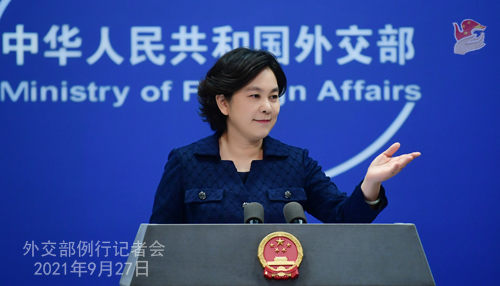
Beijing Daily: According to reports, Canadian Foreign Minister Marc Garneau said in an interview on September 26 that Canada's "eyes are wide open", and the government is now following a fourfold approach to China: "coexist," "compete," "cooperate" and "challenge". What is China's response?
Hua Chunying: State-to-state relations can only be built on mutual respect, equality and mutual benefits. China-Canadian relations are no exception.
We hope Canada can keep its eyes wide open, have a clear understanding of the situations, and adopt rational and practical China policy.
MASTV: German media polls show that the Social Democratic Party (SPD) is currently leading in the election of the lower house of the parliament. As Chancellor Merkel is outgoing, how do you comment on China-Germany relations during her term in office? What is your expectation for the development of China-Germany relations going forward?
Hua Chunying: China-Germany relations have seen sound development overall in recent years. China attaches importance to developing relations with Germany, believing that the steady and sound development of China-Germany relations meets the shared interests of the two countries. China noticed that the preliminary results of the German general election have been released. We stand ready to work with the new German government to stay committed to upholding China-Germany relations and maintaining bilateral dialogue and cooperation, continue to advance practical cooperation between the two countries in the spirit of mutual benefits and openness, and promote sound and sustained progress of the bilateral relations in line with the principle of mutual respect and seeking common ground while shelving differences.
Chancellor Merkel attaches importance to developing relations with China. She visited China for 12 times during her term, and launched and co-chaired all six rounds of China-Germany inter-governmental consultations. She helped to deepen and substantiate practical cooperation and friendly interactions in various areas with China, which have brought tangible benefits to the two countries and the two peoples, and made contribution to China-Europe exchange and cooperation and world peace and stability. China highly appreciates this. Facts have shown that as long as China and Germany keep consolidating and deepening mutual trust and follow the approach that focuses on cooperation on an equal footing for mutual benefits, the bilateral relations can continue to achieve new development. We hope the new German government can carry on the practical and balanced China policy and consolidate the keynote of cooperation in China-Germany relations.
Bloomberg: To follow up on your comment on Meng Wanzhou. You listed a number of things that the Chinese government had done to secure her release. Does the government's involvement in securing her release from the Canadian detention, the Chinese ambassador accompanying her on her return to China, and the big display from state media when she landed over the weekend undercut the argument that Huawei is independent of the government of China?
Hua Chunying: The Party and the Chinese government attach great importance to safeguarding the legitimate rights and interests of Chinese citizens and enterprises. Chinese Ambassador to Canada Cong Peiwu accompanied Ms. Meng Wanzhou back to China.
You said these efforts seem to call into question Huawei's independence. As an American media outlet, you know that US leaders have mentioned to China on several occasions that they hope US companies can be provided with more convenience and a better environment in their operation in and cooperation with China. Does this mean that no American companies are independent? What is the relationship between US businesses and US government? The government of any country has the responsibility and obligation to safeguard the legitimate rights and interests of its enterprises and citizens.
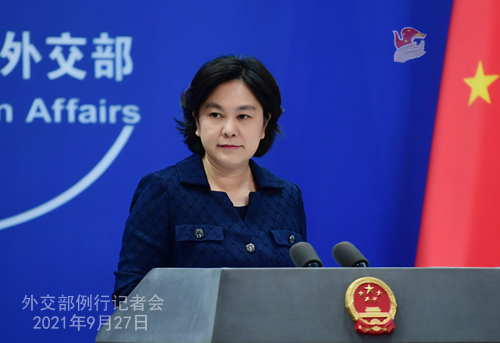
The Paper: Some foreign media believe that Meng Wanzhou's smooth return to China marks a major victory in China's resolute diplomatic struggle on the Meng Wanzhou's case. Do you agree with that?
Hua Chunying: Thanks to the unremitting efforts of the Chinese government and the strong support of the Chinese people, Ms. Meng Wanzhou has returned to China safely after more than 1,000 days of groundless detention. If we are to use the word "victory", this is a victory of the Chinese people and the force of justice.
Hubei Media Group: We noticed that on September 26, State Councilor and Foreign Minister Wang Yi attended and delivered a keynote speech at the opening ceremony of the Sustainable Development Forum 2021 via video link. Can you share more information?
Hua Chunying: Thank you for your attention to the Sustainable Development Forum hosted by China. As you said, State Councilor and Foreign Minister Wang Yi attended and delivered a keynote speech at the opening ceremony of the Sustainable Development Forum 2021, where he further expounded on the profound connotation of the Global Development Initiative put forward by President Xi Jinping at the General Debate of the 76th UNGA, and proposed China's position and proposition on implementing the 2030 Agenda for Sustainable Development and promoting cooperation on international development.
The Global Development Initiative proposed by China calls on the international community to accelerate implementation of the UN 2030 Agenda for Sustainable Development, pursue more robust, greener and more balanced global development and build a global community of development. This major initiative charts a course for global development cause and cooperation on international development. The world is facing the combined impacts of changes unseen in a century and the COVID-19 pandemic and the implementation of UN 2030 Agenda for Sustainable Development faces new challenges. Against such a backdrop, the Global Development Initiative follows the core approach that puts people at the center, makes promoting people's well-being and achieving all-round development of the people the fundamental purpose and end goal, sets people's longing for a better life as the objective, adheres to the guideline of practical cooperation, and upholds the spirit of partnership featuring openness and inclusiveness. It holds tight development, the master key to solving all problems, and works to resolve difficulties in development and create more development opportunities in an effort to leave no country and no one behind. China calls on all to take the opportunity of implementing the Global Development Initiative, deepen anti-pandemic cooperation, step up coordination on macro policies, uphold a green and low-carbon approach, equity and justice and true multilateralism and drive forward international development.
China is ready to work with all parties to usher in bright prospects of international cooperation, and continue to make relentless efforts in building a community with a shared future for mankind.
Shenzhen TV: It is reported that after China's foreign ministry published the Fact Sheet: US Interference in Hong Kong Affairs and Support for Anti-China, Destabilizing Forces, the US State Department said in response that the actions of the US were fully consistent with international law and suggesting otherwise was simply an attempt by Beijing to divert attention from "its own bad conduct", and undermined the city's appeal as a hub of openness and free exchange. What is the ministry's response?
Hua Chunying: A question to the US. Among the 102 items listed in the Fact Sheet: US Interference in Hong Kong Affairs and Support for Anti-China, Destabilizing Forces, which is not based clear facts and solid evidence?
The remarks by the US once again prove that the so-called international law the US talks about is nothing but a cover for its wanton interference in others' internal affairs to pursue hegemony and bullying based on its own liking and self-interests in the name of freedom and democracy. The "emperor's new clothes" is being seen through by more and more people
Hong Kong is a society with the rule of law, where the residents have their legal rights and freedom fully protected in accordance with law. Hong Kong ranks the third in the Global Financial Centres Index report released recently. This again shows the degree of freedom and openness in Hong Kong as an international financial center is widely appreciated. However, if the US attempts to seek any freedom of wantonly interfering in China's internal affairs and undermining Hong Kong's security and stability, I can make it clear to the US: No way!
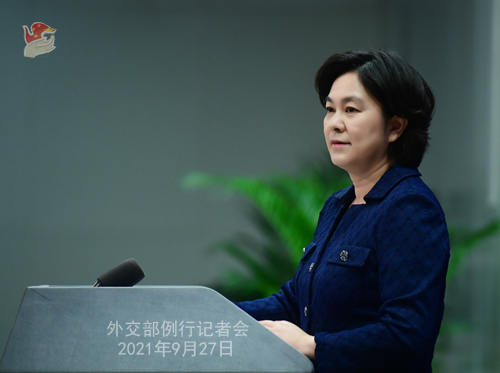
China Daily: On September 24, more than 60 countries made a joint statement at the UN Human Rights Council, supporting China's positions on issues related to Xinjiang, Hong Kong and Tibet, and opposing interference in China's internal affairs in the name of human rights. What is China's comment?
Hua Chunying: On September 24, at the 48th session of the Human Rights Council, Pakistan spoke on behalf of 65 countries. It stressed issues related to Hong Kong, Xinjiang and Tibet are China's internal affairs that allow no foreign interference and supported the implementation of One Country, Two Systems in Hong Kong Special Administrative Region. It opposed politicization of and double standards on human rights issues, opposed groundless accusations against China out of political motives and based on disinformation and opposed interference in China's internal affairs in the name of human rights. More than 30 countries supported China's legitimate positions by making statements in national capacity or co-signing a letter. The fact that nearly 100 countries spoke for justice again at the Human Rights Council fully shows justice can always prevail.
A handful of Western countries, in total disregard of facts and truth, have fabricated lies and rumors and interfered in China's internal affairs, which is rejected by developing countries. They attempt to oppress and contain other countries under the pretext of human rights and trample upon international rule of law, which is met with a firm fightback. Facts have proven again that Chinese people will never allow any attempt to politicize human rights issues with double standards and harm the basic human rights of the people of other countries, nor will the countries and people who uphold fairness and justice in the world. We urge those Western countries to seriously reflect upon what they have done, change their course and return to the right track of dialogue and cooperation.
FSN: Michael Kovrig and Michael Spavor were released on bail for medical reasons and reports also said that China may resume the case against them if they violate the conditions of bails. So first of all, will the foreign ministry be able to elaborate on what those medical reasons are and also elaborate on what the conditions of bail are as well. Also ,would you be able to share whether or not the US or Canada set as a condition for the release of Meng Wanzhou that the two Michaels had to be returned to Canada as well?
Hua Chunying: You may have learned from media reports that Michael Kovrig and Michael Spavor applied for release on bail for medical reasons. After the confirmation from related departments and diagnosis of professional medical institutes of China and under the guarantee of the Canadian ambassador to China, the Chinese courts concerned decided to release them on bail in accordance with law.
Relevant reports also listed facts in details that they were suspected of committing the crime of endangering China's national security. The two defendants confessed to their crimes, and they should strictly abide by the decision on bail made by relevant Chinese courts. In case of violation, China can resume, in accordance with law, the trial of the alleged criminal acts anytime while on bail. I would refer you to competent authorities for specific details.
As for your question on condition, I just said that the groundless detention of Meng Wanzhou is a serious mistake made by the US and Canada, which they should have corrected long ago.

China News Service: Russian Foreign Minister Sergey Lavrov noted on September 25 that nuclear submarines use weapons-grade uranium. He added that if Australia acquires nuclear-powered submarines within the framework of the new AUKUS defense alliance, Russia will probably have to request IAEA oversight. What's your comment on that?
Hua Chunying: My colleague has made clear China's position on this issue before. We believe that the cooperation between the US, the UK and Australia on nuclear submarines poses a serious risk of nuclear proliferation and violates the spirit of the Treaty on the Non-Proliferation of Nuclear Weapons (NPT). The concerns expressed by the Russian side are completely legitimate and reasonable.
The export of nuclear submarines to Australia, a non-nuclear weapon state, would involve the transfer of sensitive nuclear materials such as weapons-grade highly enriched uranium and related technology and equipment. There are gaps in the IAEA's safeguards system, which cannot effectively prevent Australia from using relevant nuclear materials to manufacture nuclear weapons. China is firmly opposed to the US, the UK and Australia's malicious exploitation of loopholes in the NPT and the IAEA safeguards mechanism, and will firmly safeguard the authority and effectiveness of the international nuclear non-proliferation regime.
At the same time, China would like to remind all parties of the serious harm of double standards on the non-proliferation issue adopted by the US, UK and Australia. The US and UK put geopolitical interests above international nuclear non-proliferation rules and help Australia become the first non-nuclear weapon state to introduce nuclear submarines, which will encourage other non-nuclear weapon states to do the same, and bring far-reaching negative impact to the resolving of non-proliferation hotspots in the region. Moreover, Australia's introduction of nuclear submarines will undercut the South Pacific Nuclear Free Zone Treaty and ASEAN countries' efforts to build a Nuclear-Weapon-Free Zone (NWFZ) in Southeast Asia, and severely sabotage regional peace and stability.
China again urges the three countries to heed the call from the international community, abandon outdated Cold War mentality and narrow-minded geopolitical concepts, revoke the wrong decision, faithfully fulfill international non-proliferation obligations and do more that benefits regional peace and stability.
Reuters: Can I clarify that China's position is that the release of Meng and the release of Kovrig and Spavor is entirely coincidental? And secondly, a British warship passed through the Taiwan Straits today. Do you have any comment on that?
Hua Chunying: We have stated many times that the Meng Wanzhou incident is completely different in essence from the cases of Michael Kovrig and Michael Spavor. Many media outlets, including those in Canada, pointed out that the Canadian side should not have done the dirty work for the US and should draw lessons. The groundless detention of Meng Wanzhou is a serious mistake made by the US and Canada, which they should have corrected long ago.
As to your second question, China's position is very clear. We hope some country can do more that helps to build mutual trust and truly safeguards regional peace and stability.
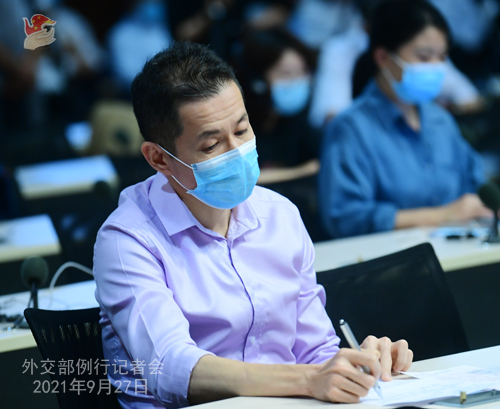
Prasar Bharati: Last week, India's Ambassador to China Vikram Misri has said that India has continued to issue visas to Chinese businessmen to visit India despite current differences in the bilateral relations, but he expressed his disappointment over China's continued visa ban on Indian students, family members, businessmen, marine crew etc. and has termed it as unscientific approach. Do you have any comment or response to this, particularly to China's unscientific approach as mentioned?
Hua Chunying: Since the start of COVID-19, China has been following science-based prevention and control measures in accordance with law, and has done our utmost to protect people's health and safety, and safeguard their life and production. Given the ongoing spread of the coronavirus across the globe, the Chinese government has to adopt a series of management measures, which is timely adjusted in accordance with the evolving situation, in order to ensure the safe, healthy and orderly flow of Chinese and foreign travelers. China's prevention and control measures are scientific, professional and appropriate. I want to stress that China applies quarantine measures equally to all inbound travelers, including its own citizens.
With effective prevention and control measures in place, China is willing to work with all countries, India included, to make proper arrangement for the exchanges of personnel in the context of COVID-19.
Bloomberg: In your early answer about Michael Kovrig and Michael Spavor, you said they pleaded guilty and then they were released on bail. Is that a fact that they pleaded guilty? That's a statement I haven't heard before.
Hua Chunying: Maybe you missed those media reports on the matter. Michael Kovrig and Michael Spavor made confession to their crimes and wrote materials of confession and repentance.
Beijing Youth Daily: On September 23, the US House of Representatives passed the amendment bill of the Fiscal Year 2022 National Defense Authorization Act (NDAA) which recommends the US administration to consider imposing sanctions against 35 Russian senior officials and businessmen under the "Global Magnitsky Act." Kremlin spokesman Dmitry Peskov and Foreign Ministry spokesperson Maria Zakharova made strong response to that. Do you have any comment?
Hua Chunying: We noted relevant reports and strong response on the Russian side. China firmly rejects the US pointing fingers at other countries and imposing unilateral sanctions under the pretext of human rights. China believes that all countries should abide by international law, opposes wanton use or threat of unilateral sanctions, maintains that all countries should resolve differences through equal-footed negotiations and rejects willful issuance of ultimatum. The US totally disregards the purposes and principles of the UN Charter, international law and the basic norms governing international relations. Such hegemonic and bullying practices are just unpopular. They have been opposed by Russia and China, and will meet rejection and opposition from more and more countries.
Global Times: it is reported that Russian Foreign Minister Lavrov on September 26 said the recent US proposal for a "Summit for Democracy", was more in the spirit of a Cold War, as it declares a new crusade against all dissenters. What's your comment?
Hua Chunying: I fully agree with Foreign Minister Lavrov. By putting together this so-called "Summit for Democracy", the US is in essence drawing a ideological line for bloc politics. This will only lead to division and confrontation, which will find no support as it runs against the trend of the times.
A crucial criterion of democracy should be whether the people's expectations, needs and aspirations are met, and whether they enjoy tangible benefits. Whether it is good or not should not be judged by what we say, but what we do. In the US, the top one percent own, govern and have it all. Is this democracy? The US politics is split and polarized, and it's "America against America". The government doesn't have the support of half the people. Is this democracy? Fooling the people and abusing their trust and making empty promises without delivering on them, is this democracy? The US has waged wars overseas based on lies and rumors, in which people lost their lives and slipped into poverty, while arms dealers and big capitalists lined their pockets. Is this democracy? Callous to people like George Floyd who can't breathe and innocent people died by gun violence, the government just sits back. Is this democracy? Living a good life while resorting to all means to suppress other countries the right to development and deny their people a good life, is this democracy?
The US side should do some soul-searching, make a correct and objective assessment of itself. It should stop acting as "the spokesperson for democracy" at will and applying double or even multiple standards on the issue of democracy, let alone trying to use the issue of democracy as a tool to suppress other countries. We hope that the US will abandon the Cold War mentality, reject the wrong practice of seeking cliques and zero-sum game, and work with other countries to practice international relations featuring mutual respect, fairness, justice and win-win cooperation, and promote the common values of humanity of peace, development, fairness, justice, democracy and freedom.
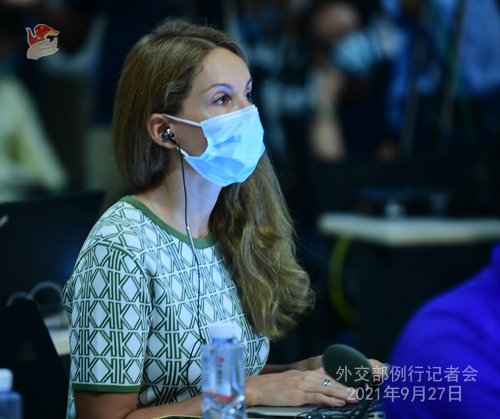
TASS: The first-ever in-person Quad summit among the US, Japan. Australia and India was concluded in the White House yesterday. The themes of discussions reportedly focused on China. What does the foreign ministry have to say about this?
Hua Chunying: We are following the Quad summit held by the US, Japan, India and Australia.
For some time, these countries have been keen on insinuating China with the so-called "rules-based order", playing up and inciting the so-called "China threat" theory, and driving a wedge between regional countries and China. China is firmly opposed to this. In response to your question, I would like to emphasize three points.
First, facts have long proved that China is a builder of world peace, a contributor to global development, a defender of the international order and a provider of public goods. China's growth means a growing force for world peace and a blessing for regional prosperity and development. China cannot be accused of "coercion" or "disruption of order".
Second, what most countries in the world recognize and accept is the international system with the UN at its core, the international order based on international law and the basic norms governing international relations based on the purposes and principles of the UN Charter, rather than the so-called "order" unilaterally defined by one or few countries. Numerous facts have shown that the US wants an order in which it wantonly smears, coerces and interferes in other countries without paying any price. It is an order in which US hegemony and bullying prevail, while the whole world grovels to the US. This so-called "order" runs counter to the trend of peace, development and cooperation of the times and the common aspiration of people around the world. It is unpopular and will never succeed.
Third, China always believes that any multilateral mechanism should conform to the trend of the times for peace and development, help enhance mutual trust and cooperation among countries, and should not target or undermine the interests of any third party. Relevant countries should abandon the outdated Cold War zero-sum mentality and ideological bias, stop forming closed and exclusive "cliques", and do more to promote solidarity and cooperation among countries in the region as well as regional peace and stability.
RIA Novosti: Last week, the former United Nations Under-Secretary-General Sha Zukang called on Beijing to re-examine its no-first-use policy on nuclear weapon. I wonder what's China's comment on his suggestions in light of new security alliance among Australia, the UK and the US. Will China consider the change of this policy?
Hua Chunying: China's nuclear policy has been clear and consistent. China has been an active advocate for the comprehensive prohibition and complete elimination of nuclear weapons. We unequivocally made the pledge of not being the first to use nuclear weapons at any time or under any circumstances and unconditionally not using or threatening to use nuclear weapons against non-nuclear weapon states or nuclear-weapon-free zones. China is the only nuclear weapon state to make and honor this commitment.
Every Chinese who loves his country is entitled to express his views on national security. Many of their views actually reveal the concern over the unilateral and hegemonic policies of the US in the field of strategic security. We hope the US government can heed the voice of ordinary Chinese people, earnestly reduce the role of nuclear weapons in national security policies, respect the legitimate security concerns of other countries, and play its due role in maintaining global strategic balance and stability.
Prasar Bharati: A follow-up. You just said that China is willing to have good arrangements for bilateral travel with India. But as I understand, China is not issuing any visas for travelers from India. So are you saying that China is planning to soon start bilateral travel with India? What did you mean? Can you kindly explain a little bit?
Hua Chunying: Maybe you didn't quite understand what I said. On the visa issue that you care about, the prevention and control measures that China has to adopt amid COVID-19 are not targeting India, but applied to everyone. China applies entry measures equally to all inbound travelers, including its own citizens. Like I said earlier, with effective prevention and control measures in place, China is willing to work with all countries, India included, to make proper arrangement for the exchanges of personnel in the context of COVID-19. China's prevention and control measures are scientific, professional and appropriate. We will make timely adjustments and proper arrangements in light of the changing situation and needs.
